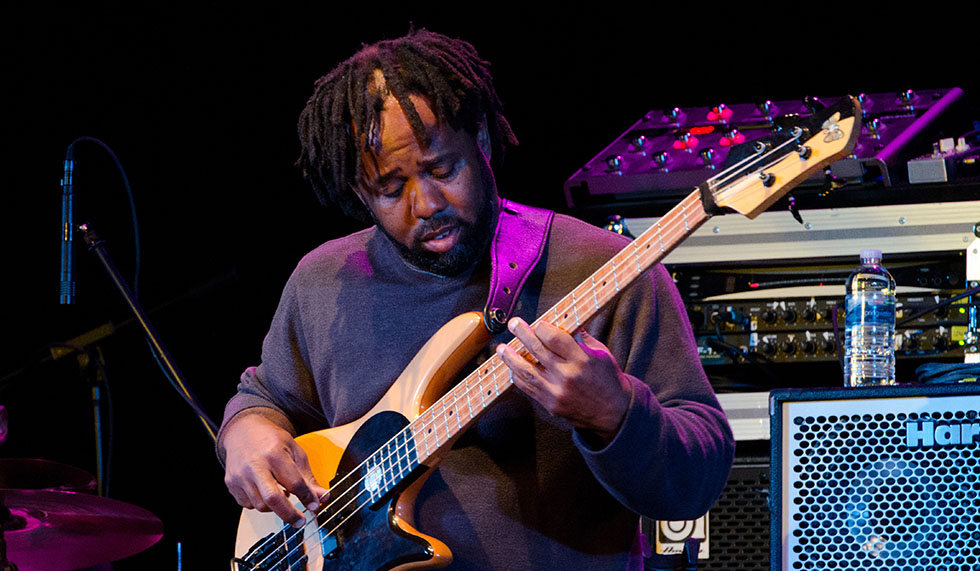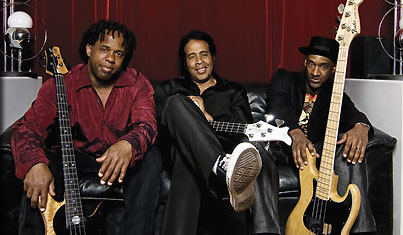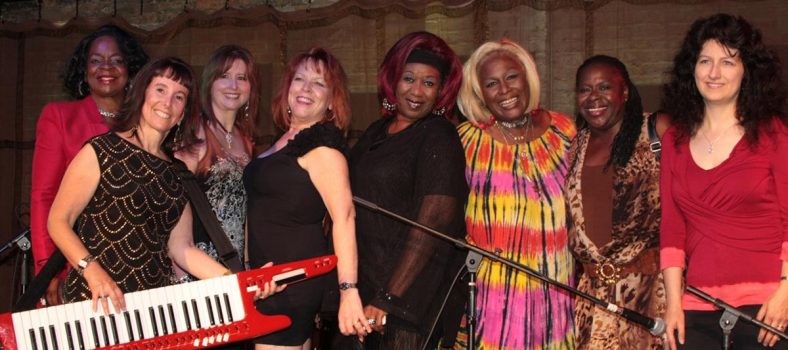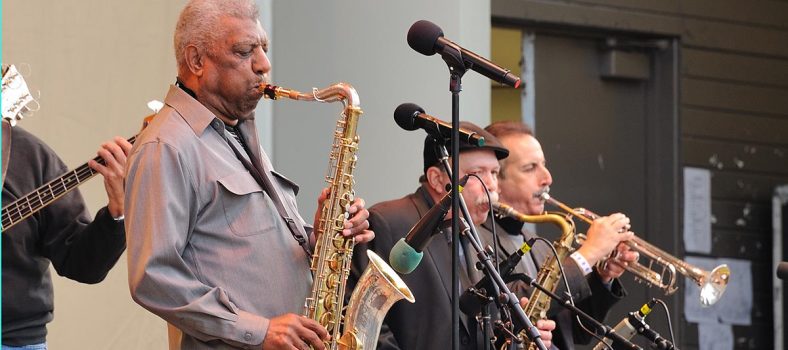 Victor Wooten
Victor Wooten
“My mom always said the world needs more than just good musicians. She said we need good people.”
There are some individuals who are quick learners and have a knack for learning a specific thing and running with it. Bassist Victor Wooten is one of those people. The youngest of five brothers who are all musicians, he was destined to become a musician as well. At the age of two Wooten began playing the bass guitar, by five he was playing in theaters and nightclubs and at six he was on tour with his brothers opening shows for legend Curtis Mayfield. Talk about learning and running with a talent like none other. Wooten says as the story is told, him learning to play the bass was a family need. “Apparently when I was born, my brothers already knew they needed a bass player. And being the youngest of the five that was me right away. I was born in to it.”
Playing alongside his brothers in the family band, his musical gifts propelled him in ways he had never imagined. Thus, him learning to play the bluegrass fiddle and later the banjo which led him to meeting Béla Fleck. Wooten and his brothers worked at Busch Gardens amusement park in Williamsburg, VA as their entertainment and once again there was a need to be met. The need was for a fiddle player, something Wooten says he had never played before. “My brother Roy, also known now as “Futureman”, he started working there first. He actually got my brothers jobs, because when they needed an accordion player, he got them to hire my brother Joseph who plays keyboards. When they first needed a bass player he got them to hire my brother Regi who plays guitar. I was only fifteen and technically too young to work in their live entertainment department so when he found out they needed a fiddle player, he convinced them to hire me but he never told them I’d never played fiddle in my life. So he got me this job and called and said, ‘Do you think you can do it?’ and I said sure. So I borrowed a violin from my school and researched the top fiddle songs and I started playing.”
Wooten’s introduction to the banjo came as a result of “messing around” with one of his band mate’s banjo in between playing at Busch Gardens. He says banjos are tuned differently than a bass, so the sound came out altered. “He (the friend from the band) said, ‘Man you sound like Béla Fleck on the banjo.’ And I had no idea who this guy; who I thought his name was Baylor I had no idea who that was, so my friend brought in some recordings of the group, the New Grass Revival which was the group Béla was in and I just got hooked. I had never heard a banjo player play like that and so that is what got me to continue messing around with the banjo. So when I finally met Béla, we realized that our playing styles were very similar to each other. So he would use his techniques on the bass and I would use my techniques on the banjo and then we started taking that to the stage and every now and then we would switch instruments in front of the audience. Even though I played banjo very little; just because I’ve done it in public people think I play more banjo than I actually do.”
Wooten says if his style of music could be defined it would defined as, “I would just say maybe a funky version of jazz or a jazzy version of funk, it’s one of those two.” Music can’t really be defined it’s like love, it’s felt, it shared, it’s given away, it’s a vibration and resonation of life, and there are those who view music this way and live their lives, well through their music as Wooten does. And while there are also many musicians who would love to play like Wooten and know what kind of “pickups” he uses or how to create their own sound he says you already have a sound, realize it and go from there. “For 30 years I have played the Fodera Bass and my original Fodera which I fell in love with back in 1983; that bass had EMG “pickups”. And because I fell in love with that bass, I fell in love with its sound and in turn fell in love with EMG pickups so that’s what I use ninety-percent of the time.
And for people trying to find their sound; I would urge them to realize that they already have a sound and work to make that sound better. It’s like everyone has their own individual speaking voice, you don’t have to find it. You can perfect it and make it better, but in my opinion the search is over. Just go with the voice you have because you sound just like you.
A bass player may be trying to sound like Bootsy (Collins) or trying to sound like Stanley Clarke but in reality you sound just like you trying to sound like Bootsy or Stanley Clarke. So if you realize you already sound like you and just make that better. If people love what you are saying with your voice, they will fall in love with your voice. So what’s more important is what you have to say with that voice. I would say focus more on having something meaningful to say that touches people’s hearts and then everyone else will try to have a voice like yours.”
 Victor Wooten, Stanley Clarke and Marcus Miller
Victor Wooten, Stanley Clarke and Marcus Miller
This sound and voice is exactly what was brought in to Wooten’s latest album Words and Tones and Sword and Stone that features all female vocalists. The title is also a play on words an idea Wooten says that was brought to him by his brother. “It takes a different kind of sensitivity to support a female vocalist and it’s something that I love to do. But I have four crazy brothers. And I say crazy in the best sense of the word meaning they are individual thinkers and when I heard my brother Regi take the story of the Sword and Stone which is King Arthur and Merlin; when he took that story and turned it around he said, ‘Sword and Stone is code word. If you take the “s” off of Sword and Stone and put it at the end of each word, you get Words and Tones’. So he said, ‘You know that there is no real story of a sword stuck in a rock that’s code word for who could really pull the hidden meanings out of words. Who could pull the words from the tones’? And I went whoa that’s heavy and its right in front of my face. So I wanted to do a record about that. I started writing music with that in mind and came up with two records for it.”
Wooten continues, “I can’t quite take credit for it. You know my brothers put a lot of ideas in my head; the way I play the way I think came from my brothers and my parents so I really owe everything to them. You know the public knows about me more than the rest but I owe it all to them.”
When it comes to Victor Wooten, music and the spirit of life go hand and hand. So much so that he created the Victor Wooten’s Center for Music and Nature Camp. A quote for the camp reads “We give students the opportunity to completely let go and be themselves while congregating in a peaceful non-competitive manner on an equal playing ground with each other and their instructors. We’ve found this to be the best environment for learning.” Freedom to learn and grow is how students learn not in a restricted environment where they are told what to learn.
Wooten adds, “In the early 90’s my brother Regi turned me on to a book called “The Tracker” and our uncle had showed it to him and it was the story of a man named Tom Brown, Jr. who had learned from an Indian how to read the signs that nature leaves behind. Like how to track animals how to read the wind patterns; all of the things that our ancestors had to know to survive. I started reading this book and I got hooked because in the story; which is a true story Tom was like a Sherlock Holmes, he could look at the ground and tell what human or what animal passed by, what they were doing or thinking and I knew that Tom was a real man so I set out to find him and I did find him and I studied with him for nearly 10 years. But when I first met him and took a class with him I was listening to him talk about nature and tracking and awareness and what he called nature, I called music and I told myself, ‘He may not know it but he’s teaching music’. And even more, this is how music should be taught. We shouldn’t be sitting in a room looking at a chalkboard or whatever, we need to be out learning how to express ourselves and feeling the wind. That’s what I want to talk about. So I started taking his exercises and his ideas and putting a musical slant on it and I realized it was affecting me not only immediately but deeply and helping me musically and how I lived my life. And basically the camp was born out of those thoughts. We need to look to nature as our teacher. I just want to bring back the awareness of who we are and the gifts we have and a natural setting brings that out.”
Because of his love for music and nature (the spirit of life) Wooten wrote the book The Music Lesson: A Spiritual Search for Growth Through Music. The book is a culmination of what he believes, how he lives his life and what he has been teaching at different schools and his camps for years. He says people have asked him to write a book although it was something he didn’t want to do at the time. “I didn’t want to do it because I never want a Victor Wooten lesson or I didn’t want to write a ‘how to book’. I always told students ‘If you like what I say, you write it down and learn it so well that it’s your words now and not mine. And then you write the book. You want a book you write it’. It dawned on me one day that instead of writing a manual, write a novel, write a fictional story but put the truth in it. I decided to write a story that way.”
Another Wooten masterpiece is his record label Vix Records his self-proclaimed “Label of Love”. This endeavor also came about due to a need. “I’ve just been a little fed up with the state of record labels,” Wooten says. “I don’t want a record executive’s kid’s owning my records, my kids should end up owning them. Also a record sells for fifteen dollars you can never find out where that fifteen dollars goes. If you’re lucky the artist will get two dollars off of it, so where does the rest of it go? I got tired of not getting those answers. So I decided that I’m going to take control of my own records and put them out myself. Also, we’re at a time now where the record industry is in a flux, meaning nobody knows where it’s going to be in 10 years. Nobody knows where it’s going to be in 5 years. I figured hey, ‘If it’s changing anyway, maybe it’ll change in my favor’, even if I sell less records I’ll know where every dollar is going and in the end my kids will end up with it.”
Wooten says he really enjoys making music and the fact that he can travel the world doing what he loves and get paid for it is a blessing. “It is a blessing we could all have if we chose it and make the sacrifices and the hard work to do it. But also, I really enjoy helping other people do it. When people come to my camps, I love showing them what they can do, not just what I can do. They’re there because I’ve done it, I’d rather them do it now. To see the looks in their eyes and the smiles on their faces when they do more than what they believed they could and we can see their lives change…That makes me happy because their lives are getting better.” And better they are, we can all use inspiration like Victor Wooten, to see the beauty of life through music. Indeed.
By Keli Denise





